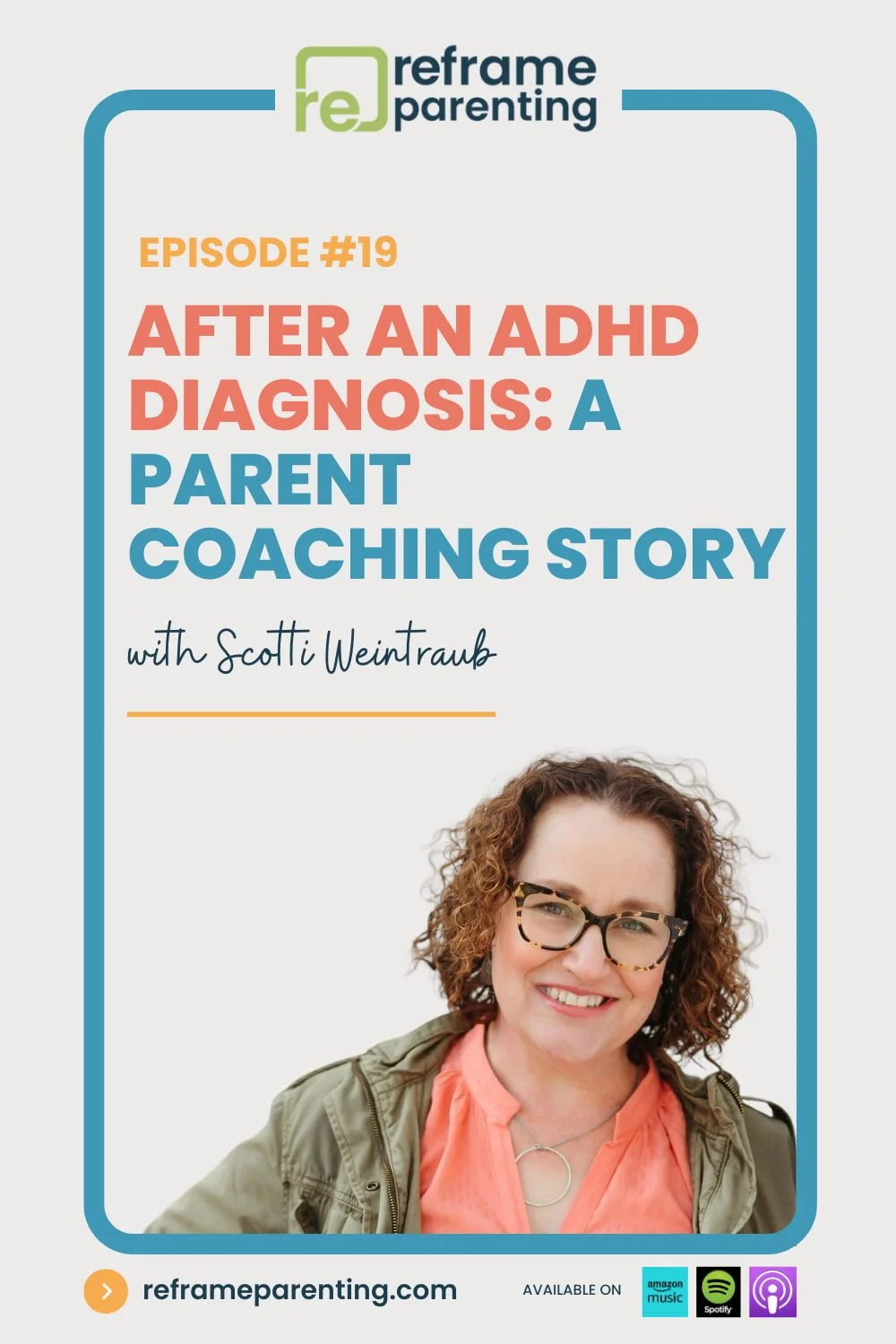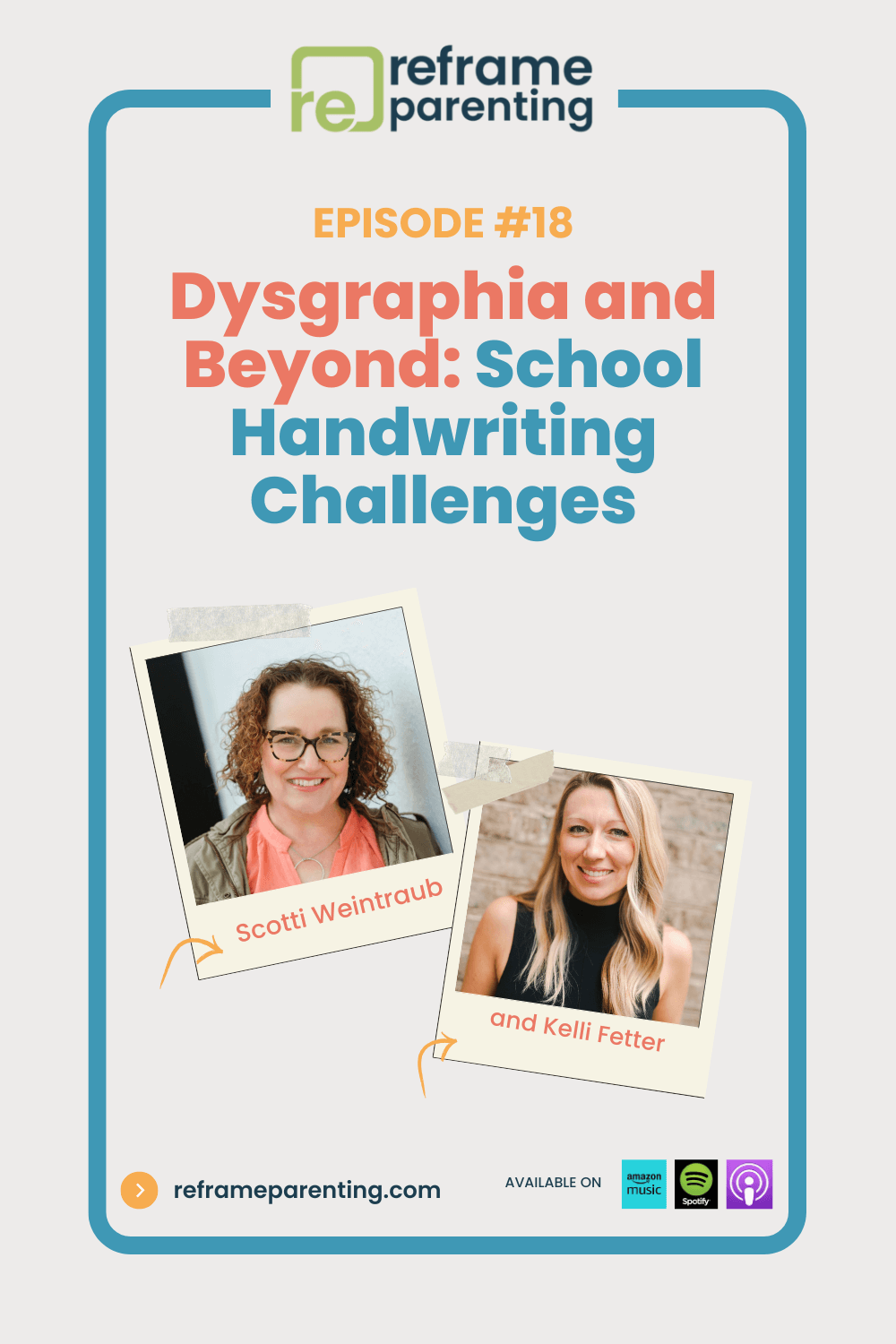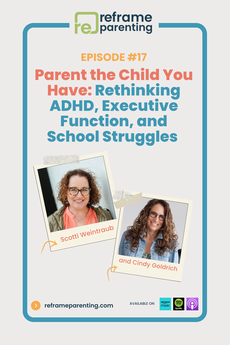4: Let’s Talk About Grades: What They Do (and Don’t) Tell You About Your Child
When report cards drop, it’s easy to see them as a verdict—on your child and your parenting. What if we shift that mindset? In this episode, Scotti unpacks what grades really measure (and what they don’t), why they hit such an emotional nerve, and how parents can respond in ways that open up connection instead of conflict. You’ll get some real questions to ask when grades aren’t what you expected, strategies to shift the conversation, and reminders that grades are a tool—not the whole story.
Key Takeaways:
Grades aren’t a verdict—they’re a starting point.
They reflect performance in a specific environment, not intelligence, effort, or potential.Your own school experiences might shape how you feel about your child’s grades.
Noticing that can help you respond with more empathy and less pressure.Your response matters more than the letter on the report card.
Asking thoughtful, supportive questions can strengthen trust and insight.Zoom out to see patterns, collaborate with teachers, and partner with your child.
Use grades as data to understand what’s working—and what support might be needed.
Resources:
Want a low-stress way to reflect, plan, and feel more confident for fall? Join the School Success Lab: Summer Edition—a 2-month membership designed to help you prep smarter, not harder.
Take the Golden Girls inspired School Support Style Quiz to find your unique superpowers.
Connect with Scotti:
Website
Instagram
Threads
LinkedIn
Ask a Question:
Got a school question on your mind?
Submit it as a listener question for a future episode
Transcript
4: Let’s Talk About Grades: What They Do (and Don’t) Tell You About Your Child
[00:00:00] When those report cards hit your mailbox, it can suddenly feel like a performance review for your child and for your parenting. Grades can give us some really useful information, but they are not the full story and they're definitely not the only way to define success. So what if we looked at them differently?
Not as a verdict, but as a conversation starter. Stick with me because later in this episode I'll share exactly what to say when your child brings home grades that aren't what you expected.
Welcome to Unlocking School Success, a podcast with the smart strategies and support parents need to help their kids thrive. I'm your host, Scotty Weintraub, parent coach, school navigator, and your go-to guide for turning School Stress and Chaos into clear strategies that work. Let's get started.
Today we're talking about something that brings [00:01:00] up a lot. For kids and for us as parents, grades those letters on a report card can hold a lot of weight. And I don't just mean GPA, they can start a whole mix of emotions. Everything from frustration to pride, relief or shame, anxiety or disappointment. What are grades really measuring and how can we shift our response so we stay connected with our kids even when the numbers aren't what we had hoped?
If you've ever stared at a report card and thought they're smarter than this, or I expect more from them, this episode is for you. Let's be real for a second. Grades feel personal, but why do they feel so high stakes? Let's talk about a few reasons. As a parent, it can feel like grades on report cards are a snapshot of what our child's future might be, or we can feel like they're a [00:02:00] reflection of our success As a parent.
Are we failing as parents if our kids are failing or barely squeaking by at school? I'm gonna argue that both of those are untrue. Let's explore a few reasons why this all might feel so loaded. Well, for one, many of us have our own long ago school baggage, and our expectations can come directly from our own experiences.
Maybe you were the straight A student and you don't understand why anyone would settle for anything less. It seems easy enough with a little hard work.
Or maybe if school was tough for you, it might be hard to watch your child face similar struggles. You want them to succeed in all the ways that you didn't, and that pressure can sneak in even with good intentions. So when a C minus on a test, a missing assignment, or even an F on a semester's report card happens, it can hit deeper than we expect.
It [00:03:00] taps into our own history, our hopes, even our insecurities, and that's a lot to, hang on. One little letter. I think it's critical to talk about the big picture here. It's like one of those things that's hiding in plain sight. Easy to miss, but essential to understand. So please listen to me when I say grades are not a direct measure of your child's intelligence.
Effort or potential. They simply measure how a student performs in a specific environment with specific rules, time limits, and expectations, and different kids experience that environment in very different ways. Think about it, if a child with A DHD who knows the content, still forgets to turn in their homework, that's probably not a lack of knowledge.
Maybe it's a lack of executive functioning skills. A kid who freezes up on timed math tests, maybe not [00:04:00] laziness, could be a stress response. That's because the system at school measures learning in very specific ways and teaches content in very specific ways as well. And those ways don't work for every kid.
So if your child learns or processes information differently, we have to look at grades differently too. Most school systems are built around a narrow definition of what it takes to be successful, sit still, follow directions, work independently, complete tasks on time, and show what you know in a very specific format.
That works well for some kids, but not for all, especially not for kids who are neurodivergent. Have mental health challenges are easily overwhelmed, have learning disabilities, or simply just need more time or creativity to show what they've actually learned. So when a child gets a lower grade, it might [00:05:00] reflect a mismatch between the learning needs and the way the content is being taught or measured, not necessarily a lack of ability or potential.
So instead of asking, why is this grade low, let's try to dig a little deeper and gather some insight to understand what might be going on underneath that grade. Try asking yourself, what might have made this hard for my child? Was this a problem with learning? Was something getting in the way?
Does this grade match what I see in my child's effort or understanding at home? What skills might be missing? Is this grade showing me a need for more support and not a lack of ability? If we treat grades like a final verdict, we can miss the real story of what's actually happening for them and we miss our chance to actually help them.[00:06:00]
Let's talk for a moment. When your kid hands you the report card or tells you they failed that test and your stomach drops, maybe you feel panic or frustration. Maybe you worry about what it all means or what comes next. You might even feel angry at the school, at your child, or just at the whole situation.
Those reactions are completely human, but how we respond in that moment, it matters. Because, well, our child is watching us, they're listening to our tone. They're trying to figure out if this grade changes how we see them, and even if they act like they don't care, there's usually something happening under that surface, whether that's their own shame, fear, disappointment, or just plain exhaustion.
So your response becomes more than just a reaction to a letter or a number. It [00:07:00] becomes a message about who they are, what you value, and whether they're safe, bringing hard things to you. Listen, I'm not being judgmental. If you've gotten to this moment wrong in the past, you are not alone. I have done it too.
We're human and school can bring up a lot for us. So the good news. You can always repair. You can always respond differently next time. So when the moment comes again and it probably will, here are some better questions to ask your child. What part of it felt hard for you? Was there anything about this assignment or class that felt confusing or overwhelming?
What do you think got in the way this time? Is there something that might help next time? Was this about understanding the material or more about focus or timing or remembering things? What support would feel helpful right now? These questions don't just help you [00:08:00] understand what's going on. They show your child that you're curious about them and not just concerned about the numbers or the grade grade.
They shift the focus from blame to partnership. How much better might that feel? Once you've opened the door with your child, it is time to zoom out a bit and look at what's really going on with all that information you just gathered. Because one grade, one class or one bad week doesn't define their whole learning story.
So let's talk about what you can do next. How to take what you're seeing, pair it with what you talk to your child about and what you know about them, and start building a plan that makes sense. First try zooming out and looking for patterns instead of zeroing in on that single grade. Take a step back.
Are you seeing this kind of feedback in just one class, or is it [00:09:00] happening in multiple classes or just one subject? Subject? Was this a one time dip during a stressful week or something that's been building over time? It's great to look at the big picture when you're not reacting in the moment so that we can see what's happening and respond to those patterns.
Next, try reaching out to the teacher, and I don't mean to ask how to get the grade up or to ask them to change their grading structure instead, asking exploratory questions can be really useful with teachers. As well as with our kids. So some questions you might ask the teacher here would be, what do you notice about how my child shows up in class?
Do they seem confused, anxious, disengaged? What supports are in place and what seems to help? What do you think might help them in the future? If we approach it like a team [00:10:00] conversation and not a confrontation, then we're opening the door to partnership and we're not asking for exceptions, we're asking for insight, and that insight can help inform how we move forward.
And we talked about this a little already, but collaborating with your child is really useful. And this isn't about. Fixing the grades, but it's about them also gaining some self-awareness about where their strengths and their challenges are. So in knowing what they think might help. That's a good place to start.
You'll be surprised. Kids are often more insightful than we give them credit for, especially when they don't feel like they're being judged. So the grades don't define who they are, and I'm betting they might need to hear that from you too. I wanna wrap up with a strong reminder.
Your child is more than a report [00:11:00] card, and so are you. I've worked with so many families where grades felt like a battlefield, and the moment they let go of that pressure, the tension lifted and conversations got easier and so did problem solving. And their child didn't have to carry the weight alone and the parent didn't feel like they had to control every outcome.
So let's use grades the way they're meant to be used as feedback, data, information. Those are tools, not verdicts. And here's something else we don't say nearly enough. So many kids go on to live meaningful, successful, fulfilling lives, even if the report cards were never impressive. Grades are a narrow snapshot.
They measure things like creativity, leadership, emotional intelligence, resilience, humor or compassion. They don't show how far your child has [00:12:00] come or how far they'll go, your child is growing in ways no grade will ever capture in those skills. They're the ones that shape the kind of person they'll become.
Remember what I said at the beginning, how you respond when the grades aren't what you hoped for. That moment matters. You don't have to have the perfect words. But you can ask better questions. You can lead with curiosity instead of judgment. And when you do that, you send your child a message that their worth isn't up for debate even when their grades aren't great.
Because at the end of the day, your child needs your belief in them more than they need a perfect report card. If you wanna get clear on how to naturally show up when school gets stressful, like when the grades aren't what you expected, my free school support style quiz is a great next step. It'll help you understand your own unique strengths, your own unique instincts and insights, and how to use them to better support your [00:13:00] child without second guessing yourself.
You'll find the school support style quiz on my website, but I'll also have a link to it in the show notes. And if this episode helps take some of the pressure off for you, send it to a friend who's deep in report card season as well, and think that they'll appreciate hearing these words too. Until next time, thanks for listening.
Thanks for tuning in to Unlocking School Success. If you're finding these episodes helpful, please hit follow, leave a review, or send it to another parent who's also navigating the school maze because no one should have to figure this out alone. You'll find full show notes@reframeparenting.com slash podcast and you can come say hi on Instagram at Reframe Parenting.
Thanks again for listening. See you next time.








